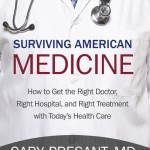



Surviving AmericanSurviving
American Medicine
Preventing disease by taking pills is easy. You pop the pills, and expect the benefits, and you’re done – no changes needed.
An equally important, but much more difficult way of preventing disease is by changing dangerous lifestyle behaviors. Examples of these behaviors are smoking, excessive alcohol consumption, drug abuse, overeating (which can result in obesity), and too little physical activity all produce harmful effects in your body.
Many patients can improve their behaviors just by telling themselves the familiar phrase, “just do it!” and the results are effective. However, most patients find that improvements in lifestyle habits are temporary, and they frequently lapse into bad behaviors again and again, with bad health as a result.
Understanding the triggers to these bad behaviors has become more sophisticated (Science 2012; 337: 1492). We respond to clues in our environment that produce bad behaviors 99% of the time. Bad behaviors become automatic, habitual, and difficult to break. This was recognized as early as 1899.
It has been found that altering your environment can improve behavior. Parking further from your place of work increases your exercise. Taking the stairs more frequently reduces obesity. Shopping in areas that have less stores selling alcohol, tobacco and junk food reduces bad dietary behavior. Using smaller plates reduces the quantity of food which you eat, preventing being overweight. Shopping for food when you are full, rather than when you are hungry results in better choices of food products. Using smaller glasses results in drinking less alcoholic beverages.
Reducing priming events may also be useful. Recording television programs and then playing them back without food, beverage and/or tobacco commercials reduces the likelihood that any commercials will be a stimulus to eat more snacks, drink more alcohol, or smoke more. Avoiding social situations where smoking by other people is common also reduces your smoking.
My tips for you are:
– Keep a diary of when you have poor health habits. Use this diary to guide reducing your exposure to bad priming events
– Discuss your bad habits with your physician and begin a program of reducing those bad health behaviors
– If your physician is not helping with controlling those habits, always consider getting a second opinion
For more information on how to use your physician more effectively to improve your behavior, increase your length of life, and reduce complications, see Surviving American Medicine.
Recent Posts
- The Big Sick Receives Dr. Presant’s HOME Award on the Red Carpet
- Dr. Cary Presant Presents Best Health Themed Film Award to The Big Sick On the Red Carpet
- Dr. Presant Awards Health Oriented Motion-picture Excellence (HOME) Award for 2017 to The Big Sick
- Birth Control Pills Increase Cancer Risk: How You Can Lower Your Risk
- What motivates your doctor in providing you medical care
Recent Comments
Archives
- March 2018
- December 2017
- September 2017
- May 2017
- February 2017
- December 2016
- October 2016
- August 2016
- July 2016
- April 2016
- February 2016
- January 2016
- December 2015
- October 2015
- September 2015
- July 2015
- April 2015
- February 2015
- January 2015
- December 2014
- November 2014
- October 2014
- September 2014
- August 2014
- July 2014
- June 2014
- May 2014
- April 2014
- March 2014
- February 2014
- January 2014
- December 2013
- November 2013
- October 2013
- September 2013
- August 2013
- July 2013
- June 2013
- May 2013
- April 2013
- March 2013
- February 2013
- January 2013
- December 2012
- November 2012
- October 2012
Categories
- academy awards
- Affordable Care Act
- Aging
- Alcoholism
- alternative medicine
- American Cancer Society
- Angelina Jolie
- Arnold Palmer
- arsenic
- bariatric surery
- best film
- blood clots
- breakthrough drugs
- Breast Cancer
- Cancer
- cancer prevention
- Cancer Treatment
- Casey Kasem
- Celebrities
- cervical cancer
- Chemotherapy
- cholesterol
- clinical trials
- Conflict of Interest
- CT scans
- diasaster
- Doctors
- Drug Cost
- Drug interactions
- Drug Side Effects
- Ebola
- elderly patients
- Electronic Medical Records
- emergency care
- Fatigue
- Festival of Books
- films
- Fiscal Cliff
- fran drescher
- Gene Testing
- Gene Wilder
- geriatrics
- Guidelines
- Health Care
- Health Insurance
- health-themed movie
- Healthcare Reform
- Heart disease
- Hillary Clinton
- Hospitals
- HPV
- illness
- Jaclyn Smith
- lung cancer
- Medical Tips
- Medicare
- Medication
- Medicines
- Melanoma
- Michael Douglas
- movie
- movies
- new years resolutions
- Nurse practitioners
- Obamacare
- Obesity
- osteoporosis
- Ovarian Cancer
- Physician Communication
- Physician Reimbursement
- Preventing infections
- Prevention
- prostate cancer
- psychosocial well-being
- ptsd
- sleep apnea
- Smoking
- Star Wars
- statins
- stroke
- sunscreen
- Supplementation
- Supreme Court
- surgical complications
- Surviving American Medicine
- terrorist attack
- Toxins
- Uncategorized
- Vaccines
- Vitamins
- What to Do
- Wrinkles


